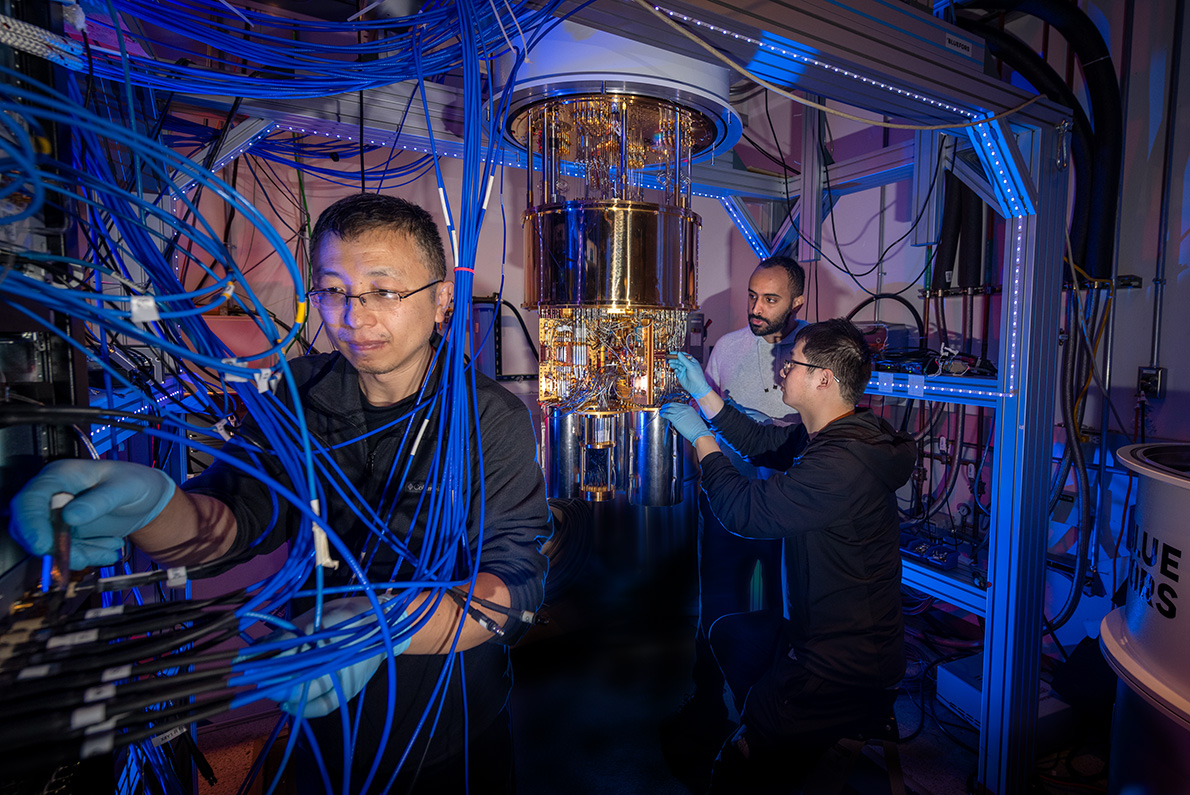QSA’s initiatives have led to over a dozen patents, numerous scientific publications, and the creation of startups that are bringing quantum technology to the market. Multiple quantum companies have benefited from QSA’s extensive research network and ongoing collaborations, utilizing the expertise, feedback, and techniques shared by QSA partners to enhance their processes. Additionally, five QSA principal investigators have co-founded quantum companies, applying research results to promising industry use cases.
QSA has also trained a new generation of scientists and engineers, many of whom are now leading quantum research at top companies and universities, alongside high school students and teachers. In addition to the 150 graduate students and 100 postdoctoral students delivering cutting edge research in QSA annually, QSA’s QCaMP program has introduced quantum to over 160 high school teachers and 3,200 students across the country. Building on this success, QSA will help create a quantum-ready workforce with new pathways and partnerships that engage undergraduates in community colleges via hands-on training programs.
To learn more about QSA’s many achievements, this article highlights five ways QSA has advanced quantum computing. And this Q&A with de Jong showcases QSA’s progress, exciting plans for the future, and the kinds of breakthroughs to expect as quantum systems grow and mature.
Leveraging QSA’s expertise and capabilities
QSA develops next-generation quantum capabilities by integrating multidisciplinary teams across its partner institutions and leveraging specialized quantum-ready facilities at Berkeley Lab, Sandia National Laboratories, and other leading institutions.
Berkeley Lab, for example, partners with industry and academia and works across the quantum research ecosystem — from theory to application — to fabricate and test quantum-based devices, develop software and algorithms, and build prototype computers and networks. Berkeley Lab’s national user facilities provide state-of-the-art resources for scientists in QSA and beyond to advance the frontiers of quantum science. This includes the Advanced Light Source, the National Energy Research Scientific Computing Center (NERSC), and the Molecular Foundry, which has a QIS cluster tool that enables researchers to experiment with dozens of materials and methods for making qubit components in a single automated system. The Molecular Foundry will also soon add a dilution refrigerator that will enable high-throughput analysis of qubits. Berkeley Lab also leads the Advanced Quantum Testbed (AQT), a collaborative research laboratory and open-access testbed to advance quantum computing based on superconducting circuits. In this video, de Jong, shares how quantum research at Berkeley Lab is forging the future of quantum breakthroughs by collaborating with researchers across institutions.
###
Lawrence Berkeley National Laboratory (Berkeley Lab) is committed to groundbreaking research focused on discovery science and solutions for abundant and reliable energy supplies. The lab’s expertise spans materials, chemistry, physics, biology, earth and environmental science, mathematics, and computing. Researchers from around the world rely on the lab’s world-class scientific facilities for their own pioneering research. Founded in 1931 on the belief that the biggest problems are best addressed by teams, Berkeley Lab and its scientists have been recognized with 17 Nobel Prizes. Berkeley Lab is a multiprogram national laboratory managed by the University of California for the U.S. Department of Energy’s Office of Science.
DOE’s Office of Science is the single largest supporter of basic research in the physical sciences in the U.S., and is working to address some of the most pressing challenges of our time. For more information, please visit energy.gov/science.
The Quantum Systems Accelerator (QSA) is one of the five National Quantum Information Science Research Centers funded by the U.S. Department of Energy Office of Science. Led by Lawrence Berkeley National Laboratory (Berkeley Lab) and with Sandia National Laboratories as lead partner, QSA catalyzes national leadership in quantum information science to co-design the algorithms, quantum devices, and engineering solutions needed to deliver certified quantum advantage in scientific applications. QSA brings together dozens of scientists who are pioneers of many of today’s unique quantum engineering and fabrication capabilities. In addition to industry and academic partners across the world, 15 institutions are part of QSA: Lawrence Berkeley National Laboratory, Sandia National Laboratories, University of Colorado at Boulder, MIT Lincoln Laboratory, Caltech, Duke University, Harvard University, Massachusetts Institute of Technology,, UC Berkeley, University of Maryland, University of New Mexico, Cornell University, University of Washington, and Canada’s Université de Sherbrooke and University of Waterloo. QSA’s industrial partners are Applied Materials, Atom Computing, IonQ, Maybell, QoLab, Quantum Machines, Quantinuum, QuEra, and Riverlane. For more information, please visit https://quantumsystemsaccelerator.org/
